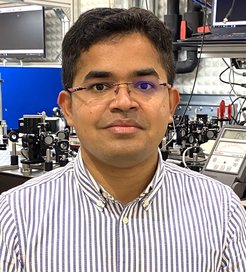Dr. Manish Garg receives the Rudolf Kaiser Prize 2022
The Rudolf Kaiser Foundation awards annually the "Rudolf Kaiser Prize", which is endowed with 30,000 euros, to a young scientist in experimental physics.

Dr. Manish Garg from Max Planck Institute for Solid State Research (MPI-FKF), has been awarded the Rudolf Kaiser Prize 2022 – one of the most prestigious German prizes for young scientists in the field of physics. The Rudolf Kaiser Prize was given to Dr. Manish Garg for ‘‘the development of a quantum microscope, which enables probing of electronic and atomic dynamics in matter at fundamental space-time limits’’.
‘Seeing’ the motion of electrons and atoms in molecules and condensed media at both their natural length and time scales is a long-awaited dream of natural sciences, as it is the key to understand and achieve full control of electronic and atomic processes in chemical reactions, exciton dynamics in atomically thin two-dimensional materials, cooper-pair dynamics in superconductors, etc. Reaching such spatial or temporal resolutions is nowadays possible, but NOT simultaneously. By integrating scanning tunneling microscopy (STM), attosecond technology and ultrafast Raman spectroscopy, the work of Dr. Garg has broken this fundamental limitation of physical sciences. He and his team have recorded the first real space-time snapshots of electronic motion in molecules (Garg et al., Nature Photonics 16, 196-202 (2022) and Garg et al., Science 367, 411-415 (2020)) and more recently atomic motion in molecules (Luo et al. arXiv:2210.02561). Utilizing their quantum microscope it’s now possible to directly map the dynamics of electrons in molecules – how they jump from one orbital to another – for the first time, with simultaneous temporal resolution of 200 attoseconds, sub-Ångstrom spatial resolution and milli-electron volt (meV) energy resolution. This basic technology provides completely new possibilities for directly observing quantum mechanical processes such as bond breaking/formation, charge transfer in individual molecules, quasiparticle dynamics in two-dimensional and correlated quantum materials.
Manish Garg studied Chemistry (major) and Physics (minor) at Indian Institute of Science Education and Research (IISER, Kolkata). Performed his doctoral and first post-doctoral work in the Attosecond Physics division at Max Planck Institute for Quantum Optics (MPQ). He has been at MPI-FKF in the Nanoscale Science Department since 2018, in the beginning as post-doctoral researcher and later on as a group leader. For his research work, he has also received the Max-Auwärter Award of the Austrian Physical Society in 2022.

The Rudolf Kaiser Prize has been awarded since 1989 to experimental physicists who have published several outstanding papers but have not yet been appointed to a chair professorship and are under the age of forty years. It is endowed with 30,000 euros. According to the will of the founder, the prize is awarded in particular to outstanding work that has not been produced "with big machines" in large-scale research facilities. Many of the scientists who have been awarded the Kaiser Prize are now highly respected, highly decorated scientists worldwide.

The Rudolf Kaiser Foundation was established in 1987 by Dr. Rudolf Kaiser and is administered by the Stifterverband. Rudolf Kaiser was born in Nuremberg in 1923, served for many years as presiding judge at the Federal Patent Office, and habilitated in experimental physics at the Technical University of Munich in 1979. There he devoted himself above all to the promotion of young scientists.

Award Ceremony
together with the award ceremony of the Humboldt Research Award to Professor Andreas J. Heinrich















